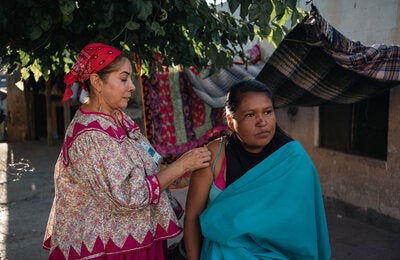
Bridgetown Barbados, 9 May 2025 (PAHO/WHO) - Assistant Director of the Pan American Health Organization (PAHO), Dr. Rhonda Sealey-Thomas, described mental health as a widespread and growing crisis in the Americas that is too often overlooked. She made the statement during the opening session of the 69th Caribbean Public Health Agency (CARPHA) Health Research Conference, held this week in Barbados under the theme “Mental Health: The Hidden Pandemic.”
“This conference will assist in bringing attention to this important issue that reduces life expectancy by 10 to 20 years. This is particularly important ahead of the United Nations General Assembly High-Level Meeting on NCDs that will be held in New York later this year,” Dr. Sealey-Thomas pointed out. While noting that in 2019, an estimated 160 million people in the Region of the Americas were living with a mental health disorder, she explained that emergencies and natural disasters of increasing scale and frequency, exacerbated by climate change, pose a growing threat to the mental health and well-being of Caribbean populations.
Dr. Sealey-Thomas also highlighted ongoing efforts across the Caribbean to decentralize mental health care from psychiatric institutions, by strengthening services at the primary health care level using the World Health Organization’s Mental Health Global Action Programme (mhGAP). “Important advances have been made in many countries in the Caribbean to improve mental health care, particularly in mental health legislation, the decentralization of mental health care from psychiatric hospitals and suicide prevention. Recently, countries such as the Bahamas and Guyana, revised their mental health legislation to ensure that their laws are rights-based and person-centered. Antigua and Barbuda, Barbados, Belize, Grenada, St. Lucia, St. Kitts and Nevis, St. Vincent and the Grenadines are all updating their mental health laws to align them with international standards of care that emphasise recovery and community integration,” she outlined.
Executive Director of CARPHA, Dr Lisa Indar highlighted that young people are also severely affected by this growing issue. “Mental health is not a side issue, it is not an afterthought, it is central to the health of our societies. Most troubling is emerging data reporting that Caribbean adolescents experience rates of depression approximately 15% higher than the global average, with contributing factors including academic pressure, exposure to violence, and limited youth-focused mental health resources,” she said.
Dr. Indar noted that depression and anxiety disorders account for nearly 50% of the disability-adjusted life years in the Region, with approximately one in four adults experiencing a diagnosable mental health condition in their lifetime. This was further supported by The Most Honourable Dr. Jerome Walcott, Minister of Health and Wellness, Barbados, who stated, “Around 15% of disabilities in Barbados are linked to mental health conditions.”
Despite the significant burden, over 70% of people in the Region who require mental health care reportedly do not receive it. Dr. Walcott highlighted the underlying challenge: “The greatest obstacle we face is stigma; it keeps too many of us silent. It delays treatment, deepens suffering, and, in its most devastating form, leads to preventable loss of life.”
Dr Sealey-Thomas commended CARPHA for prioritising mental health as a critical area of research, acknowledging the importance of collective efforts across the Region. “This is a critical investment, as scientific research saves lives, drives better health outcomes, and brings significant societal and economic benefits. At PAHO, we fully support these renewed efforts and invite you to share in our vision for a robust, efficient, and fit-for-purpose research system that generates knowledge tailored to the needs and priorities of Caribbean populations,” she affirmed.
The event emphasised the importance of investing in mental health research, highlighting its potential to save lives, improve health outcomes, and deliver lasting social and economic benefits. With growing momentum across the Region, there is a shared vision for building a robust, efficient, and responsive research system—one that generates knowledge tailored to the needs and priorities of Caribbean populations.



